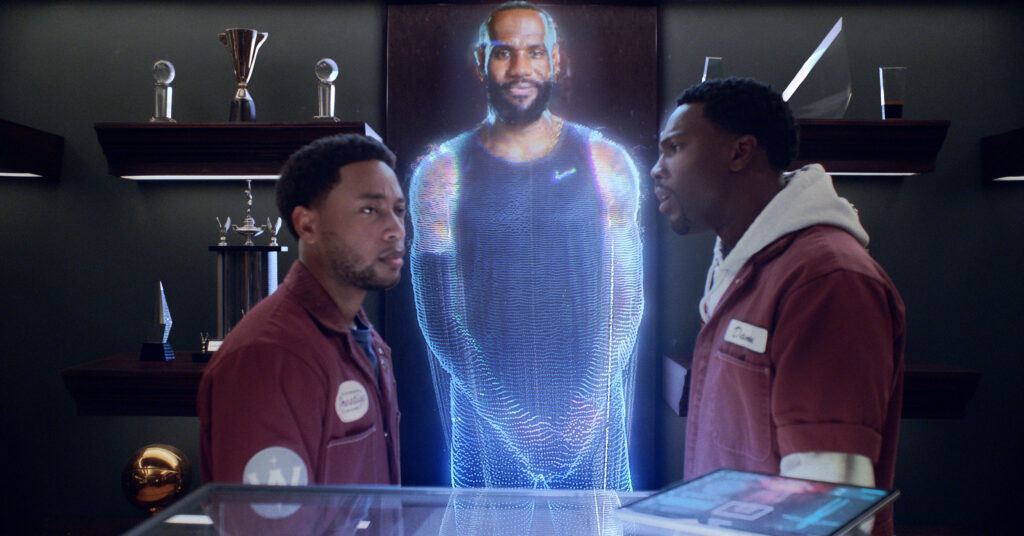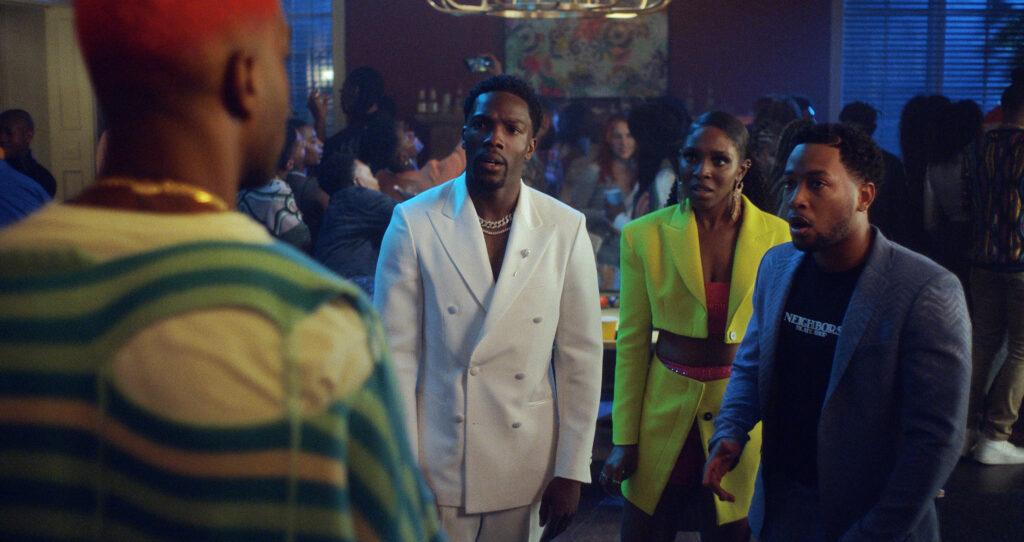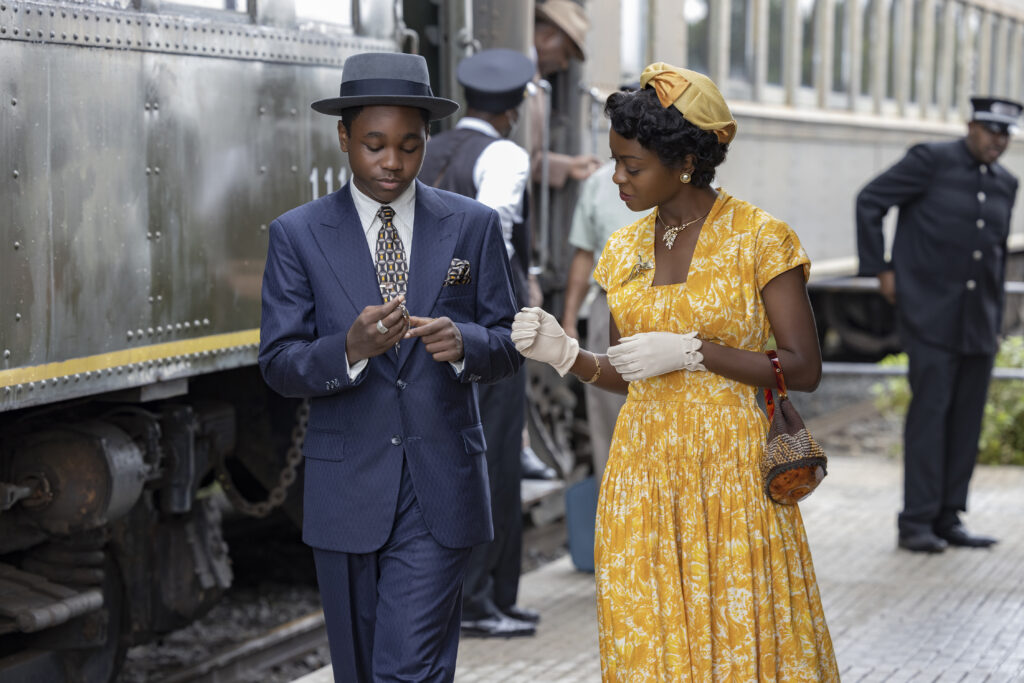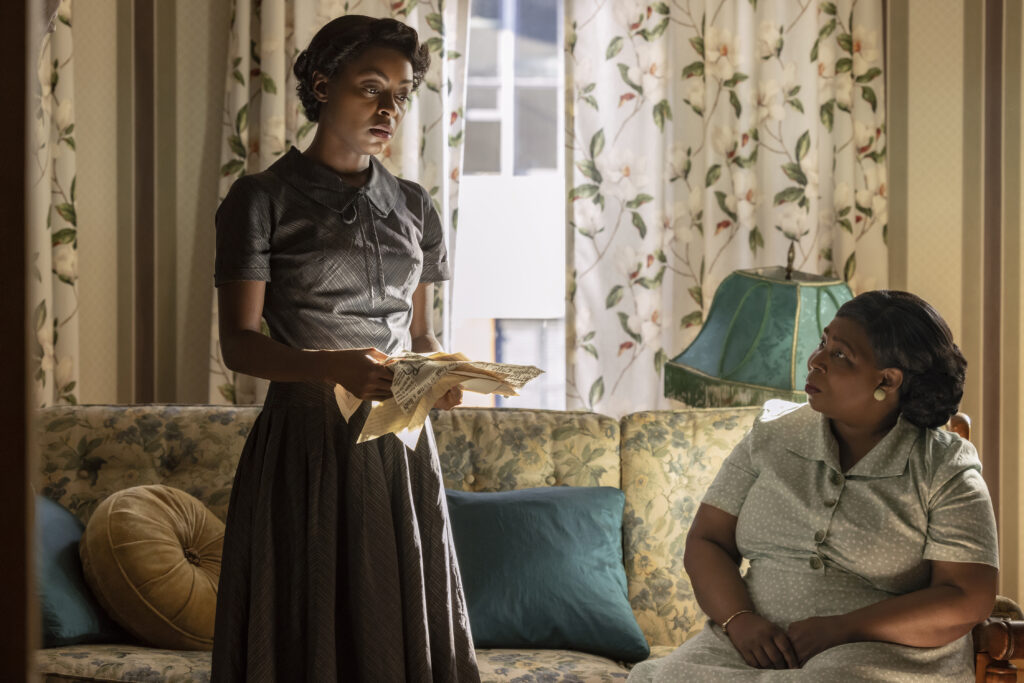January 14, 2023
by Carla Hay

Directed by Calmatic
Culture Representation: Taking place in Los Angeles, the comedy film “House Party” features a predominantly African American cast of characters (with a few white people and Latinos) representing the working-class, middle-class and wealthy.
Culture Clash: In this reboot of the 1990 comedy film “House Party,” two best friends—one who’s an aspiring musician, the other who’s an aspiring party promoter—throw an illegal party at the mansion of basketball superstar LeBron James while James is away on vacation.
Culture Audience: Aside from the obvious target audience of fans of the “House Party” comedy franchise, “House Party” will appeal mainly to people who don’t mind watching silly movie remakes that make African Americans look stupid and ridiculous.

The 2023 reboot of “House Party” is nothing but a shallow cesspool of bad jokes, mindless characters and a relentlessly dull story. The house party doesn’t get started until almost halfway through this vapid movie. The original 1990 “House Party” (written and directed by Reginald Hudlin) was by no means a masterpiece, but it was a low-budget movie that had moments of charm and genuinely hilarious comedy. This 2023 version of “House Party” is just one of many examples of a very misguided and unnecessary movie reboot that is a complete waste of time and money.
Calmatic (whose real name is Charles Kidd II) makes his feature-film directorial debut with the 2023 version of “House Party,” which uses the same concept as the original 1990 “House Party”: Two best friends experience various hijinks during a raucous house party. Jamal Olori and Stephen Glover wrote the terrible screenplay for 2023’s “House Party.”
In 1990’s “House Party” movie, which takes place in an unnamed U.S. city, best friends Christopher “Kid” Robinson Jr. (played by Christopher “Kid” Reid) and Peter “Play” Martin (played by Christopher “Play” Martin) are teenagers in high school. The basic plot is about aspiring rapper Kid sneaking out of his house to go to a house party thrown by aspiring party promoter Play, while Play’s parents are away on vacation. The two pals also have a loudmouth DJ friend, possible love interests, and a trio of bullying thugs who also factor into the story.
The 2023 version of “House Party,” which takes place in Los Angeles, uses the same template of the original “House Party” movie, except the two best friends are in their mid-20s, not underage teens. But because 2023’s “House Party” is polluted with negative stereotypes of African American men, these two clowns are supposed to be financially broke and still living with family members. The two best friends, whose names are Kevin and Damon, both have low-paying day jobs as housecleaners for a company called Windsor Prestige House Cleaning, which has a lot of wealthy people as clients.
In 2023’s “House Party,” Kevin (played by Jacob Latimore) is an aspiring R&B singer/songwriter who shares custody of his toddler daughter Destiny with an ex-girlfriend named Cher (Destiny’s mother), who is never seen in the movie. Kevin lives with his father Pops (played by Bill Bellamy) and Pops’ wife Lisa (played by Nakia Burrise), who will soon be selling the house after Pops’ planned retirement. Kevin has a good relationship with his father and stepmother, but they’ve told Kevin that he will have to find another place to live after the house is sold. Kevin needs money to find a new home and because he wants to send Destiny to an elite private school.
Kevin’s best friend Damon (played by Tosin Cole), whose name is pronounced “Duh-mawn,” is an aspiring party promoter living with his aunt Jean (played by Renata Walsh), who is a cringeworthy stereotype of an “angry black woman” in the brief time that she’s on screen. She bursts into Damon’s bedroom during the day while he’s sleeping and yells at him to wake up. And because it isn’t enough for this horrible movie to portray Damon as lazy, “House Party” depicts him as someone with bad hygiene. Jean complains about the foul body odor in Damon’s bedroom with some insults that include: “It smells like someone fucked an onion in here!”
Just like in 1990’s “House Party,” the lighter-skinned friend is portrayed as the “responsible, smarter” one who is more likely to be worried about getting in trouble, while the darker-skinned friend is the “irresponsible, dumber” one who is more likely to do reckless things that will get the two pals in trouble. It might or might not be colorism from the “House Party” filmmakers, but it sure looks like colorism to a lot of people. Even if this apparent colorism wasn’t intentional, 2023’s “House Party” has so many other problems that can’t save this movie from being a complete flop.
Kevin is confronted on the street by three thugs who are looking for Damon. The leader of this dimwitted, scowling trio is Kyle (played by Allen Maldonado), who is almost always accompanied by sidekicks Larry (played by Melvin Gregg) and Guile (played by Rotimi), who are all cartoonish because of the stupid things that they say and do in the movie. The three bullies want to rough up Damon because they think that Damon has stolen a gold chain necklace from a woman named Daisy, who is Guile’s cousin.
Kevin manages to convince Kyle, Larry and Guile that he doesn’t know anything about this alleged theft. But don’t think this will be the last time that this trio of hoodlums will appear in the movie. Viewers will later find out if Damon really did steal that gold chain necklace. It’s such an uninteresting subplot that it might as well have not been in this “House Party” remake.
Damon and Kevin were hired by Windsor Prestige Housecleaners because Kevin’s ex-girlfriend Venus Bailey (played by Karen Obilom) has some type of managerial position at the company, and she was able to use her clout to get jobs for these two slackers. When it comes to Kevin’s love life, Kevin thinks of Venus as “the one that got away,” so you know what that means: Venus is Kevin’s obvious love interest.
One day, Damon and Kevin are doing a housecleaning job at a mansion, whose owner is away on vacation. It isn’t long before they discover from snooping around the house that the mansion belongs to basketball superstar LeBron James. Damon and Kevin find a private calendar showing that the family members who live in the house are all in India for a two-week spiritual retreat.
While Kevin and Damon are snooping around the mansion, they go into a trophy/memorabilia room, where they see LeBron’s awards and possessions related to basketball, including a championship NBA ring locked in a glass case. (And it’s easy to predict what will happen to the ring and the “race against time” that ensues.) The two pals also see that LeBron has a life-sized hologram of himself in this room, with the hologram giving self-esteem-boosting pep talks.
Why is there all this LeBron James promotion in 2023’s “House Party”? James is a producer of the movie through his SpringHill Company. He also makes a cameo as himself in the movie. Considering that James was a producer and had a starring role in the awful 2021 reboot/sequel “Space Jam: A New Legacy,” maybe it’s time for him to stop making inferior remakes of movies that weren’t very good in the first place.
Not long after Kevin and Damon find out that they’re in LeBron’s mansion, Venus calls them to let them know that Kevin and Damon have been fired. Why? During a previous housecleaning job for the company, Damon and Kevin were caught smoking marijuana on the house’s surveillance video, which was sent to the company.
Kevin is desperate for money, so he comes up with the idea of charging people money to party for one night at LeBron’s mansion, with the intention to mislead the invited people into thinking that LeBron will be at the party too. At first Damon doesn’t want to do it, but he changes his mind and ends up causing more problems during the party. Before they leave LeBron’s house for the day, Kevin and Damon smoke some marijuana on the property. (“House Party” over-relies on marijuana smoking as the gag in jokes that fall very flat.)
“House Party” is so ill-conceived, viewers are supposed to believe that two complete strangers can throw this type of illegal party in a celebrity mansion and that there would be no employees of the celebrity who would find out. In fact, there are no staffers of LeBron James during the party that attracts a few hundred people, including celebrities portraying themselves. The movie never bothers to explain why this mansion doesn’t have any of the James family’s security people or other employees hired to look after it while the family is on vacation. It’s all so mind-numbingly idiotic.
The movie also expects viewers to be morons and think that this party that was marketed as being hosted by LeBron is supposed to be a “secret,” as if word of mouth doesn’t exist. In addition, people at the party are shown filming themselves or taking photos to put on their social media. And yet, there’s a scene during the party when Kevin angrily yells at Damon for revealing the “secret” party because Damon put photos of the party on social media.
One of the worst things about the 2023 version of “House Party” is that all of the characters are boring or very obnoxious. (And so are the performances by the cast members.) Damon and Kevin hire a DJ friend named Vic (played by D.C. Young Fly), who is nothing but an irritating buffoon. He’s nowhere near as funny as Martin Lawrence’s DJ character Bilal in 1990’s “House Party.”
The female characters with prominent roles in the movie are presented as dull love interests or “video vixen” types. Venus has a cousin named Mika (played by Shakira Ja’nai Paye), who’s a very superficial and materialistic party girl. Grammy-winning singer Mya portrays herself in a bland role as LeBron’s neighbor who attracts the lustful attention of Damon.
A subplot from 1990’s “House Party” that isn’t in 2023’s “House Party” is showing how white police officers constantly harass the protagonists when the protagonists aren’t doing anything wrong. It’s a social issue that could have been in a “House Party” movie of the Black Lives Matter era, but apparently this subject matter was too challenging for the filmmakers of 2023’s “House Party.” It’s probably better that 2023’s “House Party” did not have racist police harassment/abuse of African Americans as part of the movie’s story, because it’s a real-life racial problem that’s too important to be in this garbage movie.
The closest that 2023’s “House Party” comes to addressing racial issues is by having a “token” white character named Peter (played by Andrew Santino), who is a nerdy and nosy neighbor of LeBron. Peter becomes the butt of a lot of the movie’s so-called jokes because he’s supposed to be the “clueless white guy” who fails miserably at trying to appear “cool” to black people. Peter inevitably goes over to the house when he sees some of the activity going on and because his female koala named Marley has wandered over to LeBron’s property.
When Kevin and Damon answer the door, Peter is surprised to see these two strangers, who can’t get their stories straight about why they’re at LeBron’s mansion. Before Peter leaves, he tells Damon and Kevin, “By the way, Black Lives Matter.” At various times during “House Party,” the movie uses the koala (which is an obvious fake replica, not a real koala) as a weak gimmick for more unfunny jokes that get run into the ground early, such as the koala getting a contact high from marijuana smoke at the party. The visual effects in this movie are very tacky and unrealistic.
The 2023 version of “House Party” overloads on useless celebrity cameos, as if seeing these celebrities is supposed to make this junkpile movie better. Among the stars who demeaned themselves to portray themselves in this dreadful dud are Snoop Dogg, Lil Wayne, Juvenile, Tinashe, Lena Waithe, Mark Cuban, Odell Beckham Jr., Tristan Thompson and Carl Anthony Payne II. Waithe, who is an Emmy-winning screenwriter in real life, embarrasses herself by portraying a marijuana-smoking party guest who is shown brainstorming ideas for a TV series, including a show that she wants to be like “Roots,” but “in reverse,” with black people enslaving white people.
Scott Mescudi (also known as rapper Kid Cudi) has a poorly written supporting role as himself; his character is another stoned party guest. He has some of the worst lines in the movie, which makes him look like a drug-addled dolt. The 2023 version of “House Party” takes a bizarre turn with a bloody and violent subplot that looks like it’s trying to be a horror-movie parody of 1999’s “Eyes Wide Shut,” but this subplot is neither scary nor funny. Original “House Party” stars Reid and Martin (also known as rap duo Kid ‘n Play) have a very quick cameo in this gruesome part of the movie.
The release of the 2023 version of “House Party” was delayed several times—an obvious indication that Warner Bros. Pictures knew that the movie was an irredeemable bomb. At one point, the movie wasn’t going to have a theatrical release and was supposed to be released directly to HBO Max. Even if people see this version of “House Party” without paying for a movie ticket, it’s still a painfully unfunny waste of time and so horrendously stupid, even the fake koala should be ashamed to be associated with this dreck.
Warner Bros. Pictures released “House Party” in U.S. cinemas on January 13, 2023.


